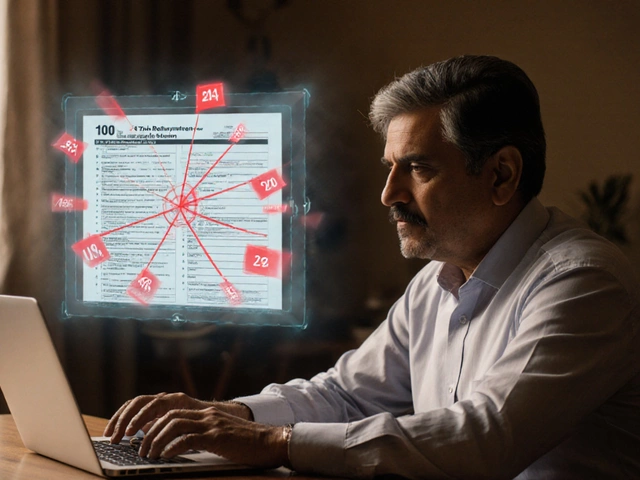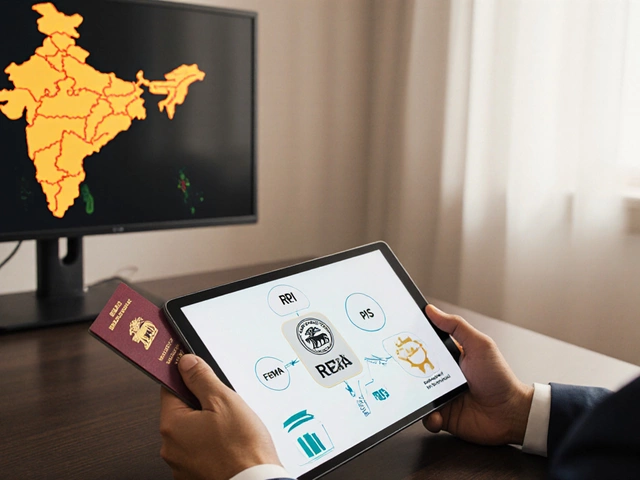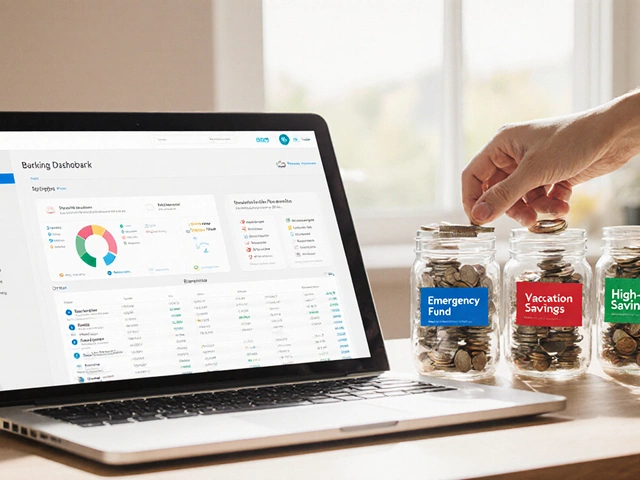
If there’s one step in financial planning that makes people sweat, it’s sitting down and looking your money straight in the eye. Getting started isn’t about picking stocks or finding the right budgeting app—it's about being brutally honest with yourself. You can’t fix what you won’t face, and a lot of people don’t even know what their real financial picture looks like.
Messy spending, debts that quietly stack up, and not knowing where your cash disappears each month—sound familiar? Most folks would prefer to skip this step entirely, but you can’t set real goals when you’re guessing. The good news? Once you actually lay out your numbers, it gets a lot easier to make changes that last.
- The Real Roadblock: Facing the Facts
- Why Avoidance Is So Tempting
- How to Get Honest About Your Numbers
- Tools and Tricks to Make It Easier
- From Fear to Action: Breaking the Cycle
The Real Roadblock: Facing the Facts
This is the bit most people dread in financial planning, but it’s the most important. Before you can get anywhere, you need to know where you stand. The tough part? Pulling together all your income, expenses, debts, and savings in one place. According to a 2023 survey from the National Foundation for Credit Counseling, nearly 60% of Americans admit they don’t keep track of their spending or have no budget at all. That’s a lot of flying blind.
The mental hurdle is real. Seeing credit card bills, student loans, or even just how much goes to takeout each month can be uncomfortable. But ignoring it only makes things worse. Once you see the real numbers, you lose that anxious, nagging feeling in the back of your mind and regain some control.
Here’s what facing the facts usually means:
- Writing down (honestly) all your sources of income.
- Listing every monthly expense—even those sneaky subscriptions you forgot about.
- Adding up all debts: credit cards, personal loans, mortgages, the works.
- Tallying your current savings, investments, and assets.
If you’ve ever wondered where your paycheck disappeared to, you’re not alone. The average American household spent $72,967 in 2023, according to the U.S. Bureau of Labor Statistics, but most people underestimate their true expenses.
| Category | Average Household Spend (2023) |
|---|---|
| Housing | $23,438 |
| Transportation | $12,294 |
| Food | $8,316 |
| Personal Insurance/Pensions | $7,178 |
| Healthcare | $5,861 |
This breakdown is eye-opening for most people. When you take your own numbers and lay them next to stats like these, you start spotting where you might be overspending, or if your money leaks out on stuff that doesn’t really matter. That’s why getting honest is the hardest part—and the most important in financial planning.
Why Avoidance Is So Tempting
It’s honestly way easier to avoid your money problems than stare them down. That gut-twisting feeling when you pull up your bank account and see a number that’s way lower than you thought? Nobody wants that. Turns out, the brain treats money stress kind of like physical pain. There’s research showing our brains light up the same way with cash worries as they do when hurt—for real.
A study from the National Endowment for Financial Education found that about 7 in 10 Americans admit to feeling stress about money. It’s no shock that worrying leads straight to dodging the issue. Opening up a budgeting app or peeking at your debt statement can spark anxiety and, for some, even shame—it feels safer just to ignore it and hope things magically fix themselves (which, spoiler alert, never happens).
Another reason folks hit the snooze button on financial planning is simple overwhelm. The most common roadblocks? Not knowing where to start, worrying there’s not enough to work with, and being afraid of what the numbers might say. Here’s how those feelings break down:
- Fear of judgment (even if it’s just your own).
- Thinking the process is too complicated.
- Bad experiences with money in the past.
- Not wanting to cut back on the stuff you love.
Check out this quick fact table—it says a lot about why people keep dodging their financial planning:
| Reason for Avoidance | Percent of People Affected |
|---|---|
| Money-related stress/anxiety | 70% |
| Uncertainty about where to start | 52% |
| Negative prior experiences | 44% |
| Embarrassment/shame | 36% |
The more you dodge, the bigger those numbers and feelings seem to get. But facing it (just once) is how you break the loop.

How to Get Honest About Your Numbers
If you’re not real with your numbers, everything else is just talk. Start by rounding up every bill, receipt, and bank statement. Don’t skip the little stuff—those coffee runs add up fast. Most people think they have a decent idea where their money goes, but a 2023 study from the National Endowment for Financial Education found that 64% of Americans underestimate their monthly spending, often by hundreds of dollars.
Here’s a simple way to clear the fog:
- Pull all your accounts into one place—savings, checking, credit cards, loans. Apps like Mint, You Need a Budget, and even basic spreadsheets work great.
- Print out (or download) your last three months of statements.
- Highlight every expense. Get specific: groceries, gas, streaming services, takeout, random Amazon buys.
- Add up your actual spending in each category.
This step might make you wince, but it’s way better than guessing. The truth sets the stage for real financial planning.
Putting your numbers in a simple table helps you spot trends and trouble. Here’s a quick mockup:
| Category | Last Month’s Spending | 3-Month Average |
|---|---|---|
| Groceries | $630 | $605 |
| Dining Out | $220 | $245 |
| Subscriptions | $110 | $108 |
| Gas/Transport | $150 | $140 |
| Other | $190 | $210 |
Don’t fudge the numbers to make yourself feel better. The fastest way to get ahead is to call it like it is.
- If you find surprise expenses or fees, write them down. Those “oops” moments are actually gold for cutting waste later.
- Keep totals visible—stick them on your fridge or use your phone wallpaper as a reminder.
- If seeing the real numbers feels overwhelming, that’s normal. Just knowing the score puts you ahead of most people who never bother getting this far.
The truth hurts for about five minutes, but the clarity lasts a lifetime.
Tools and Tricks to Make It Easier
The hardest part of facing your money is just starting. But you don’t need to break out a dusty ledger or a fancy spreadsheet. Today, there are apps and shortcuts that actually make tracking your cash way less painful. The trick is to take advantage of these helpers, so you don’t burn out or give up.
Start with apps that sync right to your bank account and credit cards. Mint, YNAB (You Need a Budget), and Personal Capital are big names for a reason. They show your real spending—and you barely have to lift a finger. With a few taps, you’ll know exactly where your money goes, and you can set up alerts if things get out of hand. If apps aren’t your thing, download your bank statements into a spreadsheet and sort your expenses by type; the truth shows up fast when you see the numbers in one place.
Here’s a quick list of easy first steps to get your financial planning rolling:
- Pick one tool—an app or a simple Excel sheet. Don’t try to use ten at once.
- Set a “money date” once a week, maybe Sunday morning. Make it a habit, like meal prepping or laundry.
- Enable transaction notifications on your phone—seeing each swipe keeps things real.
- Automate bill payments so you never miss deadlines or rack up late fees.
- If numbers stress you out, ask a friend or family member to join you for the first session. Misery loves company, and sometimes you’ll laugh at what you find.
If you want a quick look at how Americans typically organize their personal finance tools, check this out:
| Tool | Popularity (2024) | What It Does Best |
|---|---|---|
| Mint | Over 25 million users | Budget tracking, bill reminders |
| YNAB | 2 million users | Hands-on budgeting, goal setting |
| Personal Capital | 3.3 million users | Investment tracking, net worth |
| Excel/Google Sheets | Countless households | Custom tracking, full control |
The real hack? Don’t chase perfection. Even if you start messy—screenshot bank statements or scribble notes on paper—it’s better than nothing. It’s all about building a habit that sticks, not impressing anyone with pretty charts.

From Fear to Action: Breaking the Cycle
Making the leap from avoiding your finances to actually doing something about them is where everything changes. Fear is a big roadblock—research from the American Psychological Association in 2023 showed that 65% of adults feel stressed about money, and about 44% actually avoid checking their bank accounts because of it. Fact is, you’re not alone in this struggle.
The first thing to do? Get past the idea that you have to do it perfectly right away. Mistakes and slip-ups are part of the learning. Instead, focus on building habits, not chasing perfection. The people who succeed with financial planning are usually the ones who keep showing up, not the ones who have it all figured out from day one.
If you want to snap out of the avoidance rut, here are some steps you can actually follow:
- Pick a judgment-free day to look over your bank statements and debts. This is about seeing things clearly, not feeling guilty.
- Write down (or use a budgeting app to track) every dollar that comes in and goes out for a whole month. Don’t tweak anything yet—just gather the facts.
- Set one tiny, specific goal. Maybe it’s cutting $20 a week from eating out, or finally making a payment plan for a credit card. Start small and build momentum.
- If you get stuck, grab a friend or find a money accountability buddy. Studies show you’re 65% more likely to reach your goal if you commit to someone else, not just yourself.
- Schedule your next check-in. Treat your finances like any important appointment; if it’s not on the calendar, it’s easy to ignore.
Here’s a look at some real numbers so you see how much ignoring finances can cost you down the line:
| Issue | Potential Annual Cost |
|---|---|
| Late credit card payments | $252 (avg late fees on 2 cards) |
| Overdraft charges | $120 (avg two per year) |
| Impulse purchases | $1,525 (U.S. avg, 2024) |
The key is to take that first uncomfortable step, then keep going. The more you do it, the less scary it gets. Before you know it, you’re making decisions for your future self instead of running from your current mess.








Write a comment